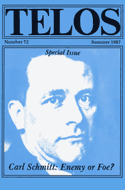In today’s episode of the Telos Press Podcast, David Pan talks with Michael Hüther about his article “Tired of Science?! Notes on the Relationship between University and Society,” from Telos 200 (Fall 2022). An excerpt of the article appears here. In their conversation they discuss what has become problematic in the relationship between science and truth and the relationship between science and values; how we should understand the role of myth in human society and why it continues to be important; how moralization responds to the dissatisfaction with science and the continuing relevance of myth; the dangers of moralization for the university; the driving forces behind the economization of the university as well as the consequences of this economization; how the German constitution establishes the social and political roles of the university; and how the university fulfills these roles today. If your university has an online subscription to Telos, you can read the full article at the Telos Online website. For non-subscribers, learn how your university can begin a subscription to Telos at our library recommendation page. Print copies of Telos 200 are available for purchase in our online store.
|
As an occasional feature on TELOSscope, we highlight a past Telos article whose critical insights continue to illuminate our thinking and challenge our assumptions. Today, Robert Wyllie looks at Richard Faber’s “The Rejection of Political Theology: A Critique of Hans Blumenberg,” from Telos 72 (Summer 1987). |
||||
|
Telos Press Publishing · PO Box 811 · Candor, NY 13743 · Phone: 212-228-6479 Privacy Policy · Data Protection Copyright © 2024 Telos Press Publishing · All Rights Reserved |
||||
 In “The Rejection of Political Theology: A Critique of Hans Blumenberg,” Richard Faber reconstructs two alternatives to Carl Schmitt’s political theology. Faber draws the first alternative from Hans Blumenberg. Blumenberg, whose later work explores how metaphor orients thought, proposes a “polytheistic” alternative to “monotheistic” political theology. Polytheism is an early modern metaphor for plural sovereignty, underlying the checks and balances of liberalism. Sympathetically, Blumenberg believes a polytheistic political theology turns away from Schmitt’s “monotheistic” picture of sovereignty where one sovereign decides the state of exception. After expositing Blumenberg’s polytheistic political theology, Faber rejects it. Instead, he turns to Walter Benjamin’s eschatological political theology. Monotheists have been promised an apocalypse, a violent divine intervention, to restore justice in the future. Unlike the Schmittian state of exception, this hoped-for intervention would ground no new legal constitution. Benjamin radicalizes the state of exception into the “pure violence” of a Marxist revolution aimed at destroying the political state altogether.
In “The Rejection of Political Theology: A Critique of Hans Blumenberg,” Richard Faber reconstructs two alternatives to Carl Schmitt’s political theology. Faber draws the first alternative from Hans Blumenberg. Blumenberg, whose later work explores how metaphor orients thought, proposes a “polytheistic” alternative to “monotheistic” political theology. Polytheism is an early modern metaphor for plural sovereignty, underlying the checks and balances of liberalism. Sympathetically, Blumenberg believes a polytheistic political theology turns away from Schmitt’s “monotheistic” picture of sovereignty where one sovereign decides the state of exception. After expositing Blumenberg’s polytheistic political theology, Faber rejects it. Instead, he turns to Walter Benjamin’s eschatological political theology. Monotheists have been promised an apocalypse, a violent divine intervention, to restore justice in the future. Unlike the Schmittian state of exception, this hoped-for intervention would ground no new legal constitution. Benjamin radicalizes the state of exception into the “pure violence” of a Marxist revolution aimed at destroying the political state altogether. 






